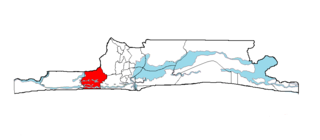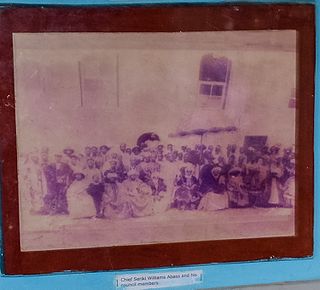Related Research Articles

Ayizan is the loa of the marketplace and commerce in Vodou, especially in Benin, Haiti and Suriname.

Lagos State is a state in southwestern Nigeria. Of the 36 states, it is both the most populous and smallest in area. Bounded to the south by the Bight of Benin and to the west by the international border with Benin for ten km, Lagos State borders Ogun State to the northeast making it the only Nigerian state to border only one other state. Named for the city of Lagos—the most populous city in Africa—the state was formed from the Western Region and the former Federal Capital Territory on 27 May 1967.
Akitoye, sometimes wrongly referred to as Akintoye, reigned twice as Oba of Lagos; first, from 1841 to 1845, and a second time, from 1851 to 1853. His father was Oba Ologun Kutere and his siblings were Obas Osinlokun and Adele.

Badagry, also spelled Badagri, is a coastal town and Local Government Area (LGA) in Lagos State, Nigeria. It is quite close to the city of Lagos, and located on the north bank of Porto Novo Creek, an inland waterway that connects Lagos to the Beninese capital of Porto-Novo. The same route connects Lagos, Ilaro, and Porto-Novo, and shares a border with the Republic of Benin. As of the preliminary 2006 census results, the municipality had a population of 241,093.
Okokomaiko is an area in the town of Ojo, located in Lagos State, southwest Nigeria, along the Lagos- Badagry Expressway. The Lagos State government, under the leadership of the former governor Akinwunmi Ambode stretched the importance of this route in the West African sub-region and had plans to expand the Lagos-Badagry Expressway to a 10-lane highway. This construction began from Eric Moore to Okokomaiko. Ambode, during his tenure as the governor, welcomed any investor who is willing to partner with the state government in the construction of the mile-2 to Badagry road project, which includes the Okokomaiko area. He said “At the moment, work is already ongoing from Eric More to Okokomaiko but we are willing to partner with any investor interested in taking up the construction of the second phase which is ten-lane road from Okokomaiko to Seme Border"

Ojo is a town and local government area in Lagos State, Nigeria, with a few notable locations such as Lagos State University and the Alaba International Market as well as others. Ojo is located on the eastern section of the Trans–West African Coastal Highway, about 37 km west of Lagos. It is a part of the Lagos Metropolitan Area.

Gberefu Island also known as Point of No Return is a populated historical island located in Badagry, a town and local government area of Lagos State, South-Western Nigeria. Symbolized by two poles slightly slanted towards each other and facing the Atlantic Ocean, the island was a major slave port after it was opened in 1473 during the Trans-Atlantic Slave Trade era. According to Nigerian historians, as many as 10,000 slaves were believed to have been shipped to the Caribbean and Americas between 1518 and 1880 from the island.

The Gun people, also rendered Ogũ, Ogun and Egun, is an ethnic group located majorly in Lagos and Ogun State in southwestern Nigeria, and Ouémé Department in the southeast of the Republic of Benin, who speak the Gun language. The Ogu account for about 15% of the indigenous population of Lagos State and 6% of the total population of the Republic of Benin.
Badagry Festival is an annual event held in Badagry, a town in Lagos State, Nigeria. It is organised by the African Renaissance Foundation (AREFO). The event reflects the significance of the ancient town during the slave trade era. It is a convergence of culture and display of African heritage. The organizer brings the indegine and culture-loving fans from around the world to celebrate the festival. One of the major highlights is the artistic display by masquerades, dancers, and fire eaters. It features football competition, the beating of Sato drum, and Liberation Day Celebration.

The Vlekete Slave Market is a market located in Badagry, Lagos State. Established in 1502 and named after the Vlekete deity, the goddess of the ocean and wind the market was significant during the Atlantic slave trade in Badagry, as it served as a business point where African middlemen sold slaves to European slave merchants, thus making it one of the most populous slave markets in West Africa.

The Agia Tree MonumentAgiya Tree Monument is on the site once occupied by the Agia Tree close to the Badagry Town Hall. The Agiya tree was a 160 feet (49 m) tree with a circumference of 30 feet (9.1 m). Significantly remarkable for being the tree under which Christianity was first preached in Nigeria by Thomas Birch Freeman and Henry Townsend on September 24, 1842, the tree lived for over 300 years until it was uprooted by a storm on June 20, 1959.
Oba Akinsemoyin reigned as Oba of Lagos from around 1704 to 1749. His father was Oba Ado and his siblings were Erelu Kuti and Oba Gabaro, whom he succeeded.
Ijanikin is a town located in Oto-Awori Local Council Development Area of Ojo Local Government Area of Lagos, Lagos state, Nigeria.

Kosoko was a member of the Ologun Kutere Lagos Royal Family who reigned as Oba of Lagos from 1845 to 1851. His father was Oba Osinlokun and his siblings were Idewu Ojulari, Olufunmi, Odunsi, Ladega, Ogunbambi, Akinsanya, Ogunjobi, Akimosa, Ibiyemi, Adebajo, Matimoju, Adeniyi, Isiyemi, Igbalu, Oresanya, and Idewu-Ojulari.

Chief Seriki Williams Abass was a renowned slave merchant in present-day southern Nigeria during the 19th century who became the "Paramount Ruler" of Badagry within the indirect rule structure established by the British.
The Anglican Diocese of Badagry is one of 13 within the Anglican Province of Lagos, itself one of 14 provinces within the Church of Nigeria. The current bishop is Joseph Adeyemi.
Babatunde Joseph Adeyemi is an Anglican bishop in Nigeria: he is the current Bishop of Badagry.

Badagry Heritage Museum is a museum in Badagry, Nigeria that is housed in the District Officer's Office built in 1863 by the British colonial government.
Chief Theophilus Olabode Avoseh, known as T. Ola Avoseh, was a local historian, writer and chief of Badagry, Lagos. He wrote several booklets and pamphlets in the English and Yoruba languages on aspects of the history and culture of Badagry and Epe towns in Lagos, Nigeria.
The First Christian Missionary Cemetery in Nigeria, also known as the Early Christian Missionary Cemetery in Badagry, is a graveyard where 19th- and 20th-century European Christian Missionaries who died in Badagry town and its environs were buried. The burial site in located along the town's General Hospital Road. It's Plus Code coordinates on Google Maps is CV7Q+CPR, 103101, Badagry, Nigeria. Some record say that over 200 missionaries were buried here. An obelisk was erected in memory of the dead missionaries. Today, the cemetery is one of the historical sites that attract tourists into Badagry town.
References
- ↑ L. C. Dioka (2001). Lagos and Its Environs. First Academic. ISBN 978-978-34902-5-3.
- ↑ Ashamu Sewanu Fadipe (2000). Commerce D'esclaves Et la Civilisation Occidentale À Badagry. Media Ace. ISBN 978-978-33660-3-9.
